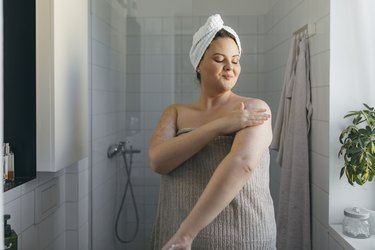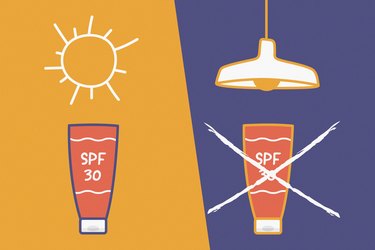
Some people turn red if they're under the sun without protection for even a short period of time, while others seem to rarely, if ever, burn. Maybe you have a dark complexion or an olive tone that gets more deeply tanned instead of lobster-like.
If your skin never gets crispy, you might be tempted to skip SPF altogether. A July 2015 study in the Journal of the American Academy of Dermatology found that, among people who don't burn after an hour in the sun, only 6 percent of men and 25 percent of women regularly wear sunscreen on their face. Researchers suspect that's because they don't perceive themselves as being susceptible to sun damage.
Video of the Day
Video of the Day
So, is it OK to take a pass on sunblock if you never get overcooked? Or can UV radiation still take a toll, no matter what your skin type? We asked derms to explain. (Spoiler alert: Sun protection is super important for everyone!)
Why Do Some People Burn While Others Tan?
It all comes down to melanin, a natural skin pigment produced in a type of skin cell called melanocytes.
"Melanin's role is to protect the DNA content of our skin cells from the sun," says dermatologist Heather Woolery-Lloyd, MD, director of the Skin of Color Division at the University of Miami Department of Dermatology and spokesperson for the Skin of Color Society. "When you look at skin cells under a microscope, melanin is like a little umbrella that sits right above the nucleus of the skin cell, closest to the sun."
This melanin umbrella partially blocks UV radiation from sunlight. The more melanin in your body, the darker your skin is, and the more natural sun coverage you have. According to a January 2016 study in the Journal of Clinical and Aesthetic Dermatology, Black skin provides an average equivalent SPF of 13.4.
Once sunlight penetrates this melanin umbrella and reaches the keratinocytes, which are the outermost skin cells, UV radiation begins to ravage the cell's DNA.
"If UV radiation damages the contents of your skin cells beyond repair, your body begins the process of apoptosis, where your skin cells essentially kill themselves — that's what a sunburn is," Dr. Woolery-Lloyd says. "Since the injured skin cells can't be salvaged, they die, slough off and you start over with new cells."
UV radiation can also damage the DNA in your cells in ways that could lead to skin cancer, according to the American Cancer Society.
People with fair skin don't have a lot of melanin, which means they are more vulnerable to UV radiation. Still, if you have Black or brown skin, that doesn't mean you're off the hook.
"The darker your skin, the more UV radiation you can tolerate, but it's not infinite," Dr. Woolery-Lloyd says. "Even people with the darkest skin tone can get blistering sunburns after a certain amount of sun exposure."
A 2012 report from the Centers for Disease Control and Prevention (CDC) found 11 percent of Black Americans and 35 percent of Hispanic Americans had at least one sunburn in the past year.
Moreover, without the telltale redness, some people with darker skin tones might not even realize they have sunburn. Per the CDC, other signs include sensitivity, swelling, blisters, headache, nausea, fatigue, flaking and skin that is warm to the touch.
Even if you didn't burn, a tan is still indicative of genetic damage to your skin cells. According to the Skin Cancer Foundation, there is no such thing as a safe or healthy tan.
You're Still at Risk for Skin Cancer
People with lighter skin tones are more likely to develop skin cancer than people with Black or brown skin because they have lower levels of protective melanin.
But cancer risk is still affected by UV light in people of color. For example, a 2016 study in the Asian Pacific Journal of Cancer Prevention confirmed repeated DNA damage from unprotected exposure to UV rays heightens the incidence of basal cell cancer for all skin types.
In people of color, 90 percent of basal cell carcinomas are found on the head or neck, where the sun's rays hit. People with darker skin tones who live in sunnier climates are also more likely to develop basal cell cancer than those located farther north of the equator.
People with darker skin can still develop squamous cell cancer or melanoma, although the incidence rate is much lower and the lesions typically develop in areas where sunlight doesn't reach. Squamous cell cancer is commonly seen in the hips, legs and feet, while melanoma presents in the palms, toes or soles of the feet.
Perhaps because these cancers can be located in out-of-the-way areas or due to the misbelief that people with darker skin can't get skin cancer, they tend to go unnoticed or misdiagnosed. A July 2019 study from the CDC found survival rates for people of color with melanoma are significantly lower than for people with white skin, likely due to delays in diagnosis.
Your Face Could Look Splotchy

Higher melanin levels offer enhanced sun protection but also make you more prone to hyperpigmentation.
"The darker your skin, the more reactive your melanocytes are," Dr. Woolery-Lloyd says. "Sun exposure triggers melanocytes to turn on and produce more melanin."
As a result, chronic unprotected sun exposure often leads to uneven skin tone, like freckles and darker splotches on your cheeks.
People with more melanin are also at greater risk for melasma, a skin condition resulting in a blotchy brown complexion.
"People with skin discoloration like melasma have a high incidence of low self-confidence, which interferes with their quality of life," says Santa Monica-based dermatologist Tanya Kormeili, MD, clinical professor of dermatology at UCLA's David Geffen School of Medicine. "Melasma gets worse in the sun, and using SPF is a huge part of preventing and correcting it." (And even once you've corrected it, it may come back if you don't stick to a sunscreen regimen, according to Harvard Health Publishing.)
You’ll Look Older Faster
First, the good news: If you have dark skin, you won't develop as many fine lines and wrinkles as people with light skin. "Because melanin provides protection against UV radiation, it is less likely to penetrate the dermis and damage your collagen and elastin," Dr. Woolery-Lloyd says.
Now here's the hitch: Remember those ultra-reactive melanocytes that cause hyperpigmentation when you spend time unprotected in the sun? According to a September 2017 study in the Maedica Journal of Clinical Medicine, mottled skin color (like freckles, dark spots and splotches) can make you look up to 20 years older than you actually are.
"Some clinical studies have found that uneven skin tone is more suggestive of age than wrinkles are," Dr. Woolery-Lloyd says. "Researchers photoshopped pictures of individuals to add either crow's feet or brown spots to their faces — the pictures with added wrinkles were perceived as younger than those with brown spots."
Keep in mind the amount of melanin in your skin isn't the only factor at play when it comes to photoaging. "Your risk of DNA damage is 20 percent genetic and 80 percent environmental — including sun exposure, diet, exposure to pollution and smoking," Dr. Woolery-Lloyd says.
She sometimes sees older patients with very fair skin who look really young, even though they used to bake in the sun. "They might have a more effective DNA repair system that is protecting them," Dr. Woolery Lloyd says. "Whereas other people have wrinkling disproportionate to their sun exposure, just because they have a genetic predisposition to it."
Plus, some drugs — like tretinoin, blood pressure meds containing hydrochlorothiazide and certain migraine pills — can also up your risk of sun damage. (You can find a complete list at the Skin Cancer Foundation.)
"These medications may suppress part of the skin's DNA repair mechanism or create a phototoxic substance in the skin," Dr. Woolery-Lloyd says. If you're taking anything on the list, sunscreen is essential.
The Best Sunscreen for People of Color
It has been the standby advice for years: Wear a broad-spectrum sunscreen with an SPF of at least 30, no matter your skin tone.
But there's something else to look for when you're shopping for sun protection these days. There has been a lot of buzz about mineral (or physical) sunscreens, which sit on top of the skin, creating a barrier that deflects UV rays. Chemical sunscreens, on the other hand, work by absorbing rays before they damage the skin. Research suggests the former are more effective and healthier.
"Chemical sunscreens break down faster and don't provide as much protection as physical sunscreens," Dr. Kormeili says. Dr. Woolery-Lloyd adds that people with sensitive skin tend to have less irritation when using mineral sunscreens, compared to the chemical kind.
In addition, a January 2020 study in JAMA found chemical sunscreens are absorbed into the bloodstream — even after a single use — where they can remain for extended periods of time.
The downside to mineral sunscreens, which contain zinc or titanium, is that the thick, white cream can lend a gray cast to darker skin. "To avoid looking like you have yogurt on your face, try a tinted physical sunscreen that matches your skin tone," Dr. Kormeili says.
So, How Bad Is It Really to Skip Sunscreen if You 'Never' Burn?
"From a cosmetic standpoint, it's pretty bad," Dr. Woolery-Lloyd says. "Even people who don't burn will still get photoaging from chronic unprotected sun exposure, so if you're concerned about fine lines, wrinkles or uneven tone, your skin won't look the way you want it to look when you're in your 40s or older."
Applying a little SPF-infused face cream every day isn't a lot to ask, and the payoff is huge.
As for skin cancer: "If you have olive or Black skin, your risk is lower, but it's not zero," Dr. Woolery-Lloyd says. "I have lots of patients with dark skin who still get skin cancer."
Do you really want to take that chance? Thought not. Now crack open that bottle of sunscreen and get your SPF on!
- CDC: "Sunburn and Sun Protective Behaviors Among Adults Aged 18–29 Years — United States, 2000–2010"
- American Cancer Society: "Key Statistics for Melanoma Skin Cancer"
- CDC: "Sun Exposure - Sunburn"
- Asian Pacific Journal of Cancer Prevention: "Skin Cancer Concerns in People of Color: Risk Factors and Prevention"
- Journal of Clinical and Aesthetic Dermatology: "Aging Differences in Ethnic Skin"
- Maedica Journal of Clinical Medicine: "Perceived Age and Life Style. The Specific Contributions of Seven Factors Involved in Health and Beauty"
- Journal of the American Academy of Dermatology: "Patterns of Sunscreen Use on the Face and Other Exposed Skin among US Adults"
- Skin Cancer Foundation: "Tanning & Your Skin"
- CDC: "Melanoma Among Non-Hispanic Black Americans"
- Skin Cancer Foundation: "Photosensitivity Report Medications"
- JAMA: "Effect of Sunscreen Application on Plasma Concentration of Sunscreen Active Ingredients A Randomized Clinical Trial"
- ACS: "What Causes Melanoma Skin Cancer?"
- Harvard Health Publishing: "Unmasking the causes and treatments of melasma"
Is this an emergency? If you are experiencing serious medical symptoms, please see the National Library of Medicine’s list of signs you need emergency medical attention or call 911.






